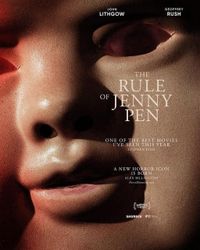In a unique twist on the horror genre, The Rule of Jenny Pen emerges as a psychological thriller that unfolds in the unsettling realm of nursing homes. Released in cinemas on March 21, 2025, the film from New Zealand seizes the often overlooked fears associated with aging and neglect within these facilities, making them a perfect backdrop for terror.
The film tells the story of a delirious patient named Dave Crealy, brought to life by the seasoned John Lithgow. He employs a baby doll called Jenny Pen to instill fear among his fellow residents. On the other side of the conflict is Stefan Mortensen, played by Geoffrey Rush, a misanthropic judge whose stroke leads him into the confines of a nursing home. As the plot thickens, Stefan finds himself confronting Dave, whose actions go unchecked by an apathetic nursing staff.
What sets The Rule of Jenny Pen apart from traditional horror films is its approach to fear. Instead of relying on excessive gore, the film taps into the disquieting atmosphere of the nursing home. Scenes rife with tension emerge not from bloodshed but from the vulnerable realities faced by its characters. One particularly distressing moment involves Dave yanking a catheter, provoking an unsettling cringe that lingers long after the scene has passed.
The movie also delves into the 'hagspolitation' genre—where elderly characters inhabit the roles typically reserved for youthful heroes or victims. There's a dynamic created in the interactions between aging individuals, revealing an antagonistic relationship to their own bodies, which reflects the broader societal discomfort with aging.
Geoffrey Rush shines in his portrayal of Stefan, embodying a character that initially appears defeated by his circumstances. His journey from frustration to resolve mirrors the struggles many face within the confines of old age. As the film progresses, Rush’s performance becomes a powerful testament to the will to confront one’s fears, both internal and external.
In stark contrast, Lithgow’s portrayal of Dave is nothing short of sensational. He injects life into the character, making Dave a truly menacing figure, especially as he interacts with the doll Jenny Pen. The lighting serves as a crucial element in triggering fear, ensuring that Jenny's hollow eyes glow ominously in the dark, amplifying the creepiness of their association.
Despite its strengths, The Rule of Jenny Pen grapples with a somewhat repetitive narrative structure. Much of the film's middle portion feels like a reiteration of Dave's terrorizing antics, which can make it seem drawn out at times. It isn't until the third act that Stefan and his roommate Tony (played by George Henare) decide to confront Dave, presenting a satisfying resolution that's well-earned after the prolonged buildup.
The film ultimately reflects the real-world parallels of neglect in aged care facilities. The dismissive attitude of the nursing staff towards Stefan’s legitimate fears about Dave resonates with viewers, shedding light on a systemic issue that often goes unnoticed. Viewers witness the chilling truth of how the elderly can be left to fend for themselves in the face of genuine danger.
Despite its cyclical plot and pacing issues, the film deserves recognition. The powerful performances by Rush and Lithgow, combined with the unsettling horror drawn from its nursing home backdrop, provide a fresh take on psychological horror that sets it apart from others in the genre. For fans of horror looking for something distinct and thought-provoking, The Rule of Jenny Pen is well worth the watch.
In conclusion, while the film may not always break new ground in terms of narrative innovation, it certainly opens a compelling discussion about the vulnerabilities of the aging population and the urgent need for compassionate care. With a blend of effective horror and heartfelt performance, the film stands as a poignant reminder of the battles fought in silence behind the walls of nursing homes.






